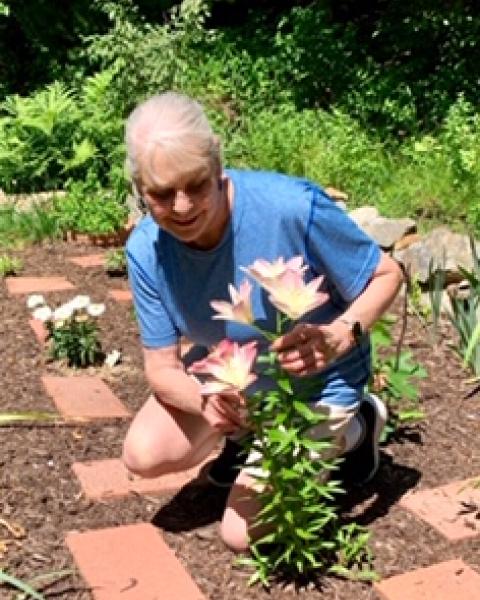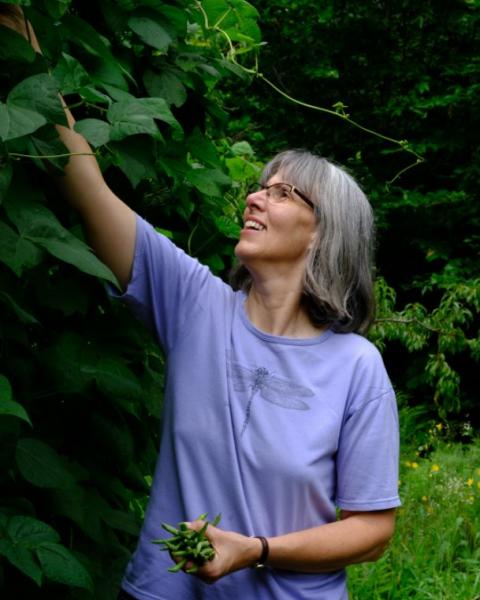Ken Koerber - A Lifelong Love of Gardening
Ken Koerber has worked in the dirt since he was a child. His parents lived in a Cincinnati suburb built on abandoned farmland with abutting woods. His father, “a true gardener,” carved out a Victory Garden on the former farm. “I got the privilege of spreading and working the load of cow manure each year, because my other siblings weren’t interested,” says 79-year old Ken, who remembers riding in his father’s wheelbarrow.
Teenager Ken had jobs working for the Cincinnati Park System. “The income was nice, but the real benefit was that I learned to identify a wide range of trees, butterflies, other insects, and native plants.”
He went on to study engineering at the Massachusetts Institute of Technology. While there he “missed the natural world,” so he put a plant on his windowsill. “It was a poor substitute for a day spent tending a garden.” The grounds of his Boston third-floor walkup had no green. He convinced his landlady to plant some barren ground with marigolds. She was so impressed she had her husband turn a dusty side yard into a lawn. “That’s when I learned one leads by example,” he says.
Ken worked 41 years as an engineer for government contractors in Lexington, MA and in Merrimack, NH before retiring in 2005. Wanting to share his gardening knowledge with others, he became a Master Gardener in 2006.
His first project was helping to create teaching gardens at the Massabesic Audubon Center in Auburn. Three years later, an old pasture had become a 1/3rd of an acre of themed gardens for youth to learn about raising food and caring for the earth.
He remembers making a chance visit to Canterbury Shaker Village when he moved to New Hampshire. “I was impressed by the extensive flower garden and the number of volunteers working on its upkeep,” he says. “By 2015, the garden was gone, along with the cadre of volunteers.” Recently the Village enlisted UNH Extension and Master Gardeners in the redevelopment of the gardens. “I liked the idea and became the project manager,” Ken says. “The result was a demonstration garden with 17 herbs typical of what the Shakers were growing and selling circa 1850.”
Closer to his home in Dunbarton Ken has also helped with various garden projects at the Dunbarton Elementary School.
Ken and his wife, Susan, bought the 150-acre farm in Dunbarton in 1968. Alarmed by Rachel Carson’s book, Silent Spring, they decided to raise their own vegetables and meat. “We restored the soil, grew produce, raised pigs, a few steers, and always had a small chicken flock,” he says. “It was a long commute to my job in Massachusetts for a few years, but the loamy-clay soil and the cows grazing in the pasture behind the house made it worth the long days.”
After their two daughters and son left “for their own careers,” the couple, who have eight grandchildren, shifted focus to growing flowers. “Currently, we supply flowers — zinnias, dahlias, scabiosa and ornamental grasses — to a florist in Goffstown, as well as selling bouquets from a cart on our front lawn.” They also continue to share their knowledge with young people who come to the farm as WWOOFer Interns (World Wide Opportunities on Organic Farms). With Ken, the teaching grows right along with the plants he raises.
UNH Cooperative Extension Master Gardener volunteers share information about home, yard, and garden topics with the people of New Hampshire. Got questions? Master Gardeners provide practical help finding answers to your questions through the Ask UNH Extension Infoline. Call toll free at 1-877-398-4769, Monday to Friday, 9 a.m. to 2 p.m., or e-mail us at answers@unh.edu.


